Shorena Kakabadze, Kutaisi
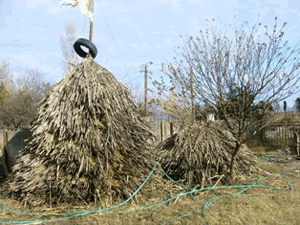 In Samtredia everybody knows the village of Ianeti and so-called ninth settlement in the village where repatriated Meskhetians have lived for 28 years already. Initially, in 1982, only 5 families were repatriated from Kabardo-Balkan and settled in a small village of Imereti region. Later 30 families joined them and during Stalin’s governance, Meskhetians from Meskhet-Javakheti region became residents of Imereti region.
In Samtredia everybody knows the village of Ianeti and so-called ninth settlement in the village where repatriated Meskhetians have lived for 28 years already. Initially, in 1982, only 5 families were repatriated from Kabardo-Balkan and settled in a small village of Imereti region. Later 30 families joined them and during Stalin’s governance, Meskhetians from Meskhet-Javakheti region became residents of Imereti region.
“Our family arrived here from the village of Nalchik from Kabardo-Balkan in 1983. I remember I was in the army and from there I directly arrived here in Ianeti village. By that time there were only 4 small houses here. The government built houses for us and we paid 55 rubles per month from our salary. We all worked at the factory regardless our age; we were happy because we had returned back to Georgia,” said Malkhaz Bakhtadze who was declared to be head of village by his neighbors because he is clever man.
Malkhaz Bakhtadze lives in Ianeti together with his family. In order to keep his family he works far from his house in Turkey. He said otherwise it is difficult to keep family because there is no employment in the district and particularly in the village. As for his small garden, he can cultivate it even in two or three days.
This small garden is very barren and family cannot harvest much. However, in the 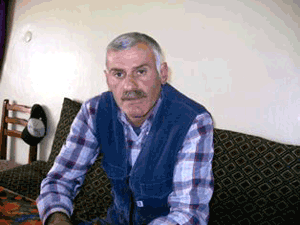 past, like other neighbors they cultivated larger lands and even sold some vegetables and fruit; consequently, they lived wealthy. Today, even recalling how cultivation of the land was forbidden makes him angry. Despite much resistance, he could not protect his rights like his neighbors and gave in. Local authority considered that local businessman needed the land more than repatriated Meskhetians.
past, like other neighbors they cultivated larger lands and even sold some vegetables and fruit; consequently, they lived wealthy. Today, even recalling how cultivation of the land was forbidden makes him angry. Despite much resistance, he could not protect his rights like his neighbors and gave in. Local authority considered that local businessman needed the land more than repatriated Meskhetians.
“They came and measured our land; they even offered something to us but we immediately realized that they tried to cheat us. It happened 3-4 years ago and I remember everything very clearly. Former governor of our neighbor village Partskhanakanebi Nikoloz Nikabadze organized all this. He offered us to buy the land if we did not want to give it away. Of course we could not buy it and remained without land. Today in order to earn money we work on the land in Turkey like slaves while there is much work in our country; but nobody hires us here. We hear many promises but nothing is done in fact,” said Malkhaz Bakhtadze and speaks about other problems of the village.
Road, gas and water supply has been main request of locals to the government for many years already. Today, on the way to the village we see remains of communist asphalt and water ponds; we think that nobody lives beyond this road. The situation is particularly difficult in winter when the village is flooded and life become impossible.
Besides that, living in isolation from local population creates problems for Turk-Meskhetians. They say if they had contact with other neighbors, they could have had more useful information. There is more than 10 kilometers from the next village and it is difficult to walk that distance. The bus has not run in the ninth settlement for several years already.
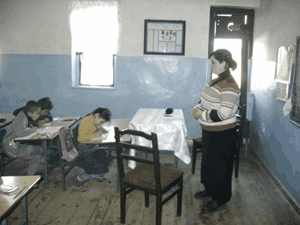 Problems are in territorial management too. Turk-Meskhetians are registered in the village of Ianeti in Samtredia district; the territory they live in belongs to Tskaltubo district.
Problems are in territorial management too. Turk-Meskhetians are registered in the village of Ianeti in Samtredia district; the territory they live in belongs to Tskaltubo district.
In short, according to locals, they have plenty of problems. When everything is settled, they are happy like little children. For example, when public school of Ianeti was not closed, they were so happy that celebrated the fact by one-week-long party.
“They were coming and thanked to us. In this village school is the only public institution where people go and meet each other. I have been teaching at this school for 11 years already and I am getting sure about the value of this institution day-by-day,” said teacher of Ianeti Public School Lamzira Tevzadze.
Today, pupils of the first, second and third forms are sitting in one classroom. There are only 7 financial groups in the school and only 11 teachers work there.
“We hardly arrive here from Samtredia. There is no transport running from Samtredia to the village. We walk from the central high-way and reach the school all muddy or wet to the skin. We endure this horrible situation because we know the value of this school for local people,” said teachers.
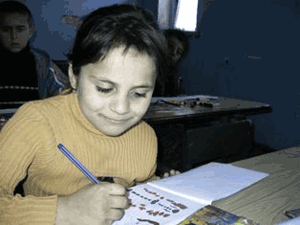 The school, and particularly classrooms, reminds the picture scene seen in old films with its interior. Although, wood-oven heats the classroom, children say the smoke often creates problems for them.
The school, and particularly classrooms, reminds the picture scene seen in old films with its interior. Although, wood-oven heats the classroom, children say the smoke often creates problems for them.
There are 24 pupils in the school and girls are among them too. In the past, girls did not go to school. Muslim Meskhetian family members claimed female should not go to school and wives could not resist their husbands.
“Not only wives and family members but we, teachers also urged the men to allow their daughters to school but in vain. They were firm in their decision and it took years to overcome this prejudice. Today, the fathers are happy that their daughters know to read and write. If in the past we teachers bought books for them, today they buy textbooks. That means, they started to think in different 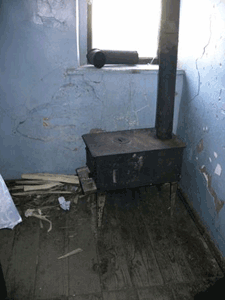 way,” said Lamzira Tevzadze.
way,” said Lamzira Tevzadze.
Pupils of second and third forms cannot speak Georgian fluently, but for the pupils from first grade it is serious problem. However, children already know their future professions. Aida Lazishvili will be a doctor, Koba Mestapaeva and Zapar Tsatsanidze will be dentists. In short they have big plans like their parents.
“We do not request much, only road in order to enable people to visit us. We also request water because we have to carry vessels from very long distance; we urge the government to pay attention to us. We will take care of other problems ourselves; we will work hard and bring up honorable people for our country. We are not lazy to work and I think it is very well seen in our house and estate,” said Malkhaz Bakhtadze.
Unlike his neighbors, Malkhaz Bakhtadze speaks Georgian fluently. Almost every family in the settlement speaks Georgian-Russian-Azerbaijan. Their traditions are also mixed – Georgian-Muslim.
“They spoke about repatriation of some more families. This information was reported on TV. It has no sense unless they create minimum living conditions for them. It is very hard to live in strange environment without employment. We have already endured it and we do not wish the same to others… those people will not arrive here under similar conditions. Promises announced on TV are not enough to live normally; real situation is very strict and difficult,” said Malkhaz Tabatadze. His family members, like entire ninth settlement, hope that 2010 will be better than previous years and will have road, gas and water supply this year.



